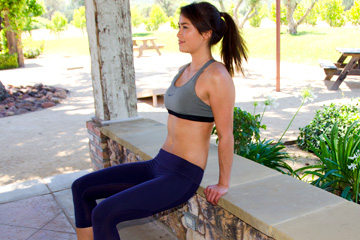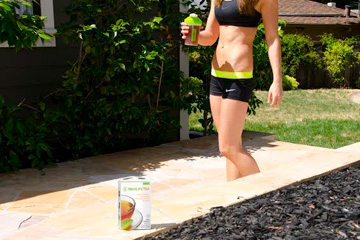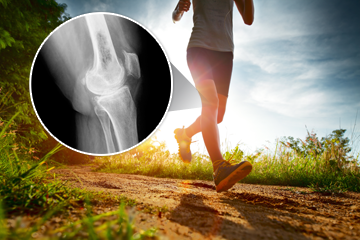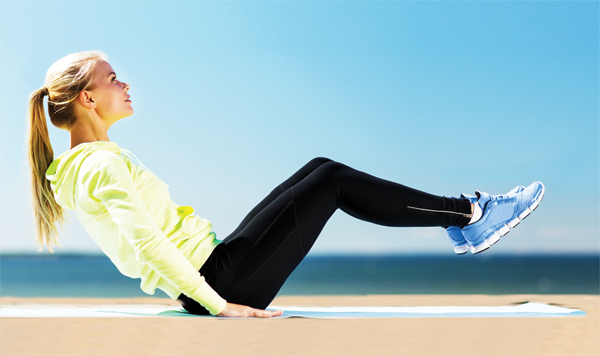 SUMMER EXERCISE #3
SUMMER EXERCISE #3
Tricep Dips
TARGETS:
» upper bodyRead More
Tips from NeoLife Challenge Coach Jessica Trautner
Some of us are lucky enough to have active jobs where we can move around. But the sad truth is that many of us sit at a desk for 8-10 hours a day with little activity and movement. Then we go straight home and sit at the table for dinner or relax on the couch reading or watching tv.
With so much going on in our daily lives it seems tough to squeeze in some exercise or cook a healthy dinner. Luckily we’ve got some tips to stay healthy during the workday!Read More
 Tips from NeoLife Fitness Coach Kendra Brassfield
Tips from NeoLife Fitness Coach Kendra Brassfield
Boxing is a sport that’s had a big time rise in popularity in the last couple years. Fitness lovers are flocking to reasonably priced boxing gyms, loving the high-intensity cardio and sleek muscle-sculpting routines. And better yet, it can be done from anywhere!Read More
 By NeoLife Fitness Coach Kendra Brassfield
By NeoLife Fitness Coach Kendra Brassfield
My favorite way to supercharge a workout is by drinking NeoLifeTea an hour to 30 minutes before. Here’s why:Read More
 Now that the weather is warming up, there are a ton of local fun runs, 10ks, and sporty outdoor events coming up. We encourage you to leverage these events for your business – and your health. Get your NeoLife Club Members and Promoters together for a fun group activity! You can even make the fun run your 30-Day Fitness Challenge goal.
Now that the weather is warming up, there are a ton of local fun runs, 10ks, and sporty outdoor events coming up. We encourage you to leverage these events for your business – and your health. Get your NeoLife Club Members and Promoters together for a fun group activity! You can even make the fun run your 30-Day Fitness Challenge goal.
 Ever heard the term ‘they woke up on the wrong side of the bed’?
Ever heard the term ‘they woke up on the wrong side of the bed’?
The way our morning starts can have a surprisingly big impact on our attitude and feelings the rest of the day. Make it a point to be one of those people that woke up on the right side of the bed and start your morning with this workout that can brighten your day!Read More
 Why wait until the new year to achieve your health goals? End 2014 strong! Don’t you want to show off the best you when running into all your friends and family during the holiday season? Kick start the New Year with just 3 steps to impress em’ all!Read More
Why wait until the new year to achieve your health goals? End 2014 strong! Don’t you want to show off the best you when running into all your friends and family during the holiday season? Kick start the New Year with just 3 steps to impress em’ all!Read More
 Osteoporosis and low bone mass are a major health issue for more than 50 million Americans. By 2020, half of all Americans over 50 years are projected to be at risk of osteoporosis-related fractures. Large percentages of Americans fail to meet the recommendations for optimal calcium, magnesium, and vitamin D intake. Emerging science shows that we need more than just calcium to optimize bone health. Learn why calcium, magnesium and vitamin D are required to be strong to the bone!Read More
Osteoporosis and low bone mass are a major health issue for more than 50 million Americans. By 2020, half of all Americans over 50 years are projected to be at risk of osteoporosis-related fractures. Large percentages of Americans fail to meet the recommendations for optimal calcium, magnesium, and vitamin D intake. Emerging science shows that we need more than just calcium to optimize bone health. Learn why calcium, magnesium and vitamin D are required to be strong to the bone!Read More
 Just in case you need a little extra pep in your step to make working out a priority, here are some reasons that working out is a must for everyone.Read More
Just in case you need a little extra pep in your step to make working out a priority, here are some reasons that working out is a must for everyone.Read More
 First of all, we don’t believe the excuse “I don’t have time to exercise”! What that statement is really saying is “I’m not making exercise a priority”. You shouldn’t need to wake up super early (because sleep is very important for both weight loss and recovery), or ignore your other responsibilities in order to make working out a priority, but rather just look to all of the short term and long term benefits for sustained motivation.Read More
First of all, we don’t believe the excuse “I don’t have time to exercise”! What that statement is really saying is “I’m not making exercise a priority”. You shouldn’t need to wake up super early (because sleep is very important for both weight loss and recovery), or ignore your other responsibilities in order to make working out a priority, but rather just look to all of the short term and long term benefits for sustained motivation.Read More
 A study found in the American Journal of Preventative Medicine found that aerobic exercise at a dose consistent with public health recommendations is an effective treatment for mild to moderate depression.
A study found in the American Journal of Preventative Medicine found that aerobic exercise at a dose consistent with public health recommendations is an effective treatment for mild to moderate depression.
Ever find it interesting that people who workout on a regular basis don’t seem to complain about being tired, or sluggish, but rather they tend to exude a positive and invigorating energy? Science tells us why!Read More
 An informative session by Jessica on the Be Your Best Challenge and an exciting reveal of the 2013 Challenge Champions! Hear inspiring stories from this year’s winners!Read More
An informative session by Jessica on the Be Your Best Challenge and an exciting reveal of the 2013 Challenge Champions! Hear inspiring stories from this year’s winners!Read More
 To reduce your chances of developing type 2 diabetes (T2D) incorporate both aerobic and muscle-strengthening activities into your routine! Aerobic exercise is physical activity that increases your breathing and heart rate- like power walking, jogging and swimming. Try resistance training and yoga as muscle-strengthening and conditioning activities to work your muscles.
To reduce your chances of developing type 2 diabetes (T2D) incorporate both aerobic and muscle-strengthening activities into your routine! Aerobic exercise is physical activity that increases your breathing and heart rate- like power walking, jogging and swimming. Try resistance training and yoga as muscle-strengthening and conditioning activities to work your muscles.
A recent Harvard School of Public Health study found that muscle strengthening and conditioning activities are associated with a lower risk of T2D. The Harvard study followed nearly 100,000 women over eight years, and found that women who did more than 150 minutes a week of muscle strengthening or conditioning activity had a 40% lower risk of developing T2D than women who did no muscle work. In addition, women who did at least 150 minutes a week of aerobic exercise and 60 minutes a week of muscle-strengthening were a third as likely to develop T2D as inactive women.Read More